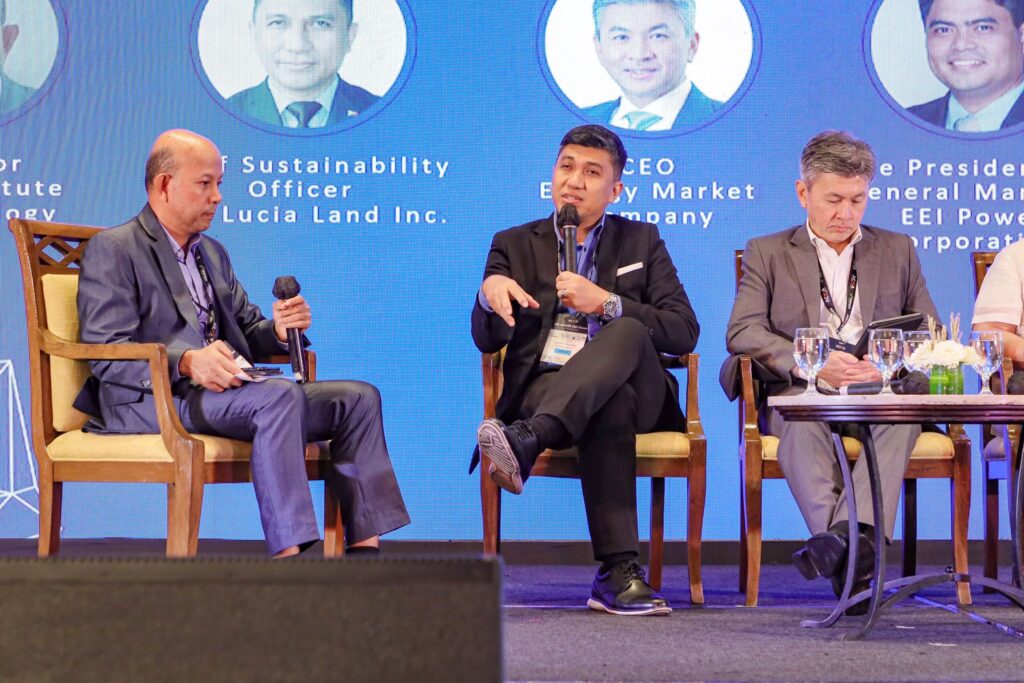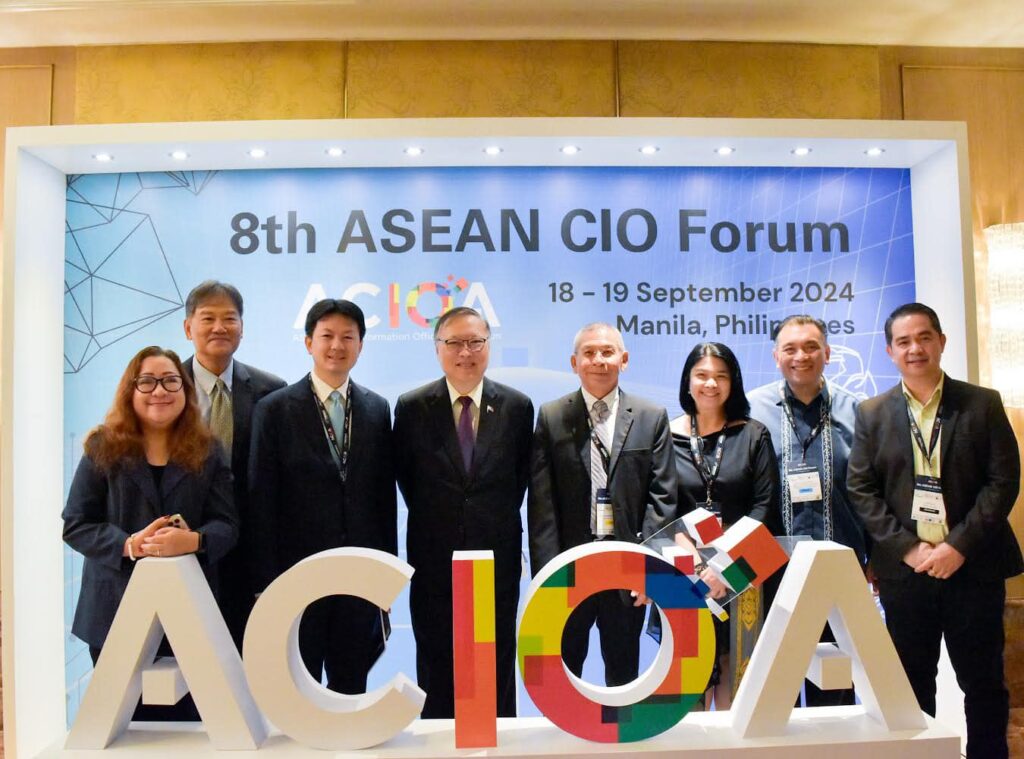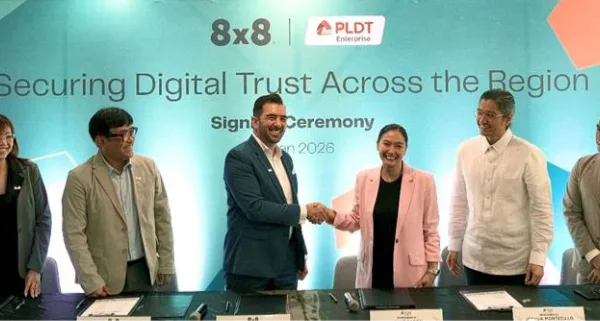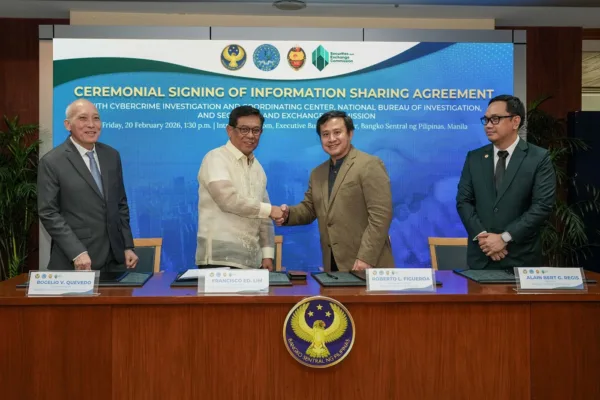Cybersecurity and green innovation initiatives were the order of the day as Chief Information Officers (CIOs) from across Southeast Asia gathered recently to showcase their strong commitment to regional digitalization efforts at the 8th ASEAN CIO Association (ACIOA) Forum and Exhibition, held at Dusit Hotel in Makati City.
The forum, themed “Empowering C-Suites: Pioneering ASEAN’s Sustainable Digital Future with AI, Cybersecurity, and Green Innovation,” highlighted key topics such as digital transformation, AI adoption, cybersecurity, and sustainability challenges in the region.

Jeremiah T. Pampolina (center), Chief Sustainability Officer of Sta. Lucia Land Inc. (SLI), shares his views on his company’s green and sustainability efforts with Dr. Nophea Sasaki (left), the forum’s moderator
A major highlight of the event was the appointment of Jeremiah T. Pampolina, Chief Sustainability Officer of Sta. Lucia Land Inc. (SLI), to ACIOA’s Executive Committee on Green and Sustainability. Pampolina, a champion for corporate sustainability, shared Sta. Lucia’s efforts to integrate green innovations, such as the installation of solar panels at Sta. Lucia Mall in Cainta and the establishment of a 60-hectare nature reserve in Palo Alto, Baras, Rizal.
In an interview, Pampolina emphasized the importance of supporting marginalized communities while balancing environmental practices in real estate development. “For me, sustainability is not just about environmental practices. It’s also about supporting social enterprises and creating inclusive opportunities for marginalized sectors, such as people with disabilities and women,” he shared.
Pampolina also said that sustainability is a holistic approach, integrating social equity with environmental stewardship. “By ensuring that our initiatives not only reduce environmental impact but also uplift underrepresented groups, we create a more inclusive society where everyone can benefit from sustainable growth.” He also provided a concrete example of Sta. Lucia’s commitment to sustainability, mentioning a proposal from their chairman. “Our chairman was suggesting that all our lampposts — yung mga yellow — what if we change all of them to solar? That’s a simple idea, isn’t it?”
“But since we have around 300 projects, so of course, the challenge is the capital needed to replace all of them,” he said while explaining how such green innovations can have a significant environmental impact. At the same time, he noted that the real estate industry must also carefully consider financial implications while prioritizing sustainability goals.
Pampolina further pointed out that real estate development has the unique potential to address both environmental concerns and social issues. “Incorporating green practices such as renewable energy sources and resource-efficient designs into our developments is essential, but equally important is ensuring that the benefits of these innovations extend to marginalized communities.”
For his part, Baljit Singh, Head of Planning, Strategy and Governance of Digital Nasional Berhad, talked about why today’s executives need a new sustainable technology framework to drive Environmental, Social and Governance (ESG) impact within and beyond the business. “Stakeholder pressure is driving businesses to incorporate ESG factors in all aspects of the organization. The technologies that executives are using today (like ERP) are helpful for now, but more will be needed to maintain continuous progress on goals,” he said.
Cybersecurity meets sustainability: The challenges with AI and robotics

The discussions on digitalization were closely linked with the growing emphasis on cybersecurity, especially in the Philippines. Jonathan C. Pineda, Senior Vice President and CIO of the Government Service Insurance System (GSIS), acknowledged the challenges AI and robotics pose to the workforce, stressing the need to balance technological progress with sustainable practices.
This reflects the broader concern in the Philippines where cybersecurity is a critical issue as organizations integrate advanced technologies.
With Benjamin Goh, Senior Vice President for Deep Cybersecurity Capabilities at ST Engineering, warning of increasingly sophisticated cyber threats, the forum underscored the importance of AI-driven cybersecurity solutions.
In the Philippines, cybersecurity concerns are growing as the country rapidly adopts digital solutions across industries. The recent uptick in cyberattacks highlights the need for robust defenses, particularly in critical sectors like finance and government, where data protection is paramount.
Steve Ledzian from Google Cloud also addressed cybersecurity at the forum, offering AI-powered solutions like Google’s Security AI Framework, which could bolster the Philippines’ response to persistent cyber threats. Given the country’s increasing reliance on digital infrastructure, particularly through initiatives like DICT’s National Cybersecurity Plan, AI-driven cybersecurity frameworks are essential to safeguarding sensitive data from attacks like ransomware and phishing scams.

Photo shows (from left:) Atty. Jocelle Batapa-Sigue, Mr. Ng Hoo Ming, H.E Sok Puthyvuth, DICT Secretary Jan Ivan Uy, Mr. Chaicharearn Atibaedya, Miss Mel Migrino, Usec. Jesus S. Domingo Gary, and Mr. Apol Salud
With Department of Information and Communications (DICT) Secretary Jan Ivan Uy as keynote speaker, the 8th CIAO Forum also brought together sustainability and digital innovation experts as they discussed interrelated goals for the region’s future.
In the Philippines, this intersection is evident as businesses prioritize green initiatives alongside enhancing cybersecurity. Pampolina’s role at Sta. Lucia Land and his appointment to the ACIOA Executive Committee signify the broader trend where sustainability and technological security go hand in hand.
As the 8th ASEAN CIO forum concluded — with over 600 C-suite executives from Southeast Asia and the Philippines participating — the focus on sustainability, coupled with the rising need for advanced cybersecurity solutions, showed that the digital future of ASEAN, and the Philippines in particular, must prioritize both environmental responsibility and digital resilience.
In the end, one can say that leaders like Pampolina, alongside cybersecurity experts, are shaping a future where technological innovation and sustainability work together to build a secure and responsible digital economy in the region.







